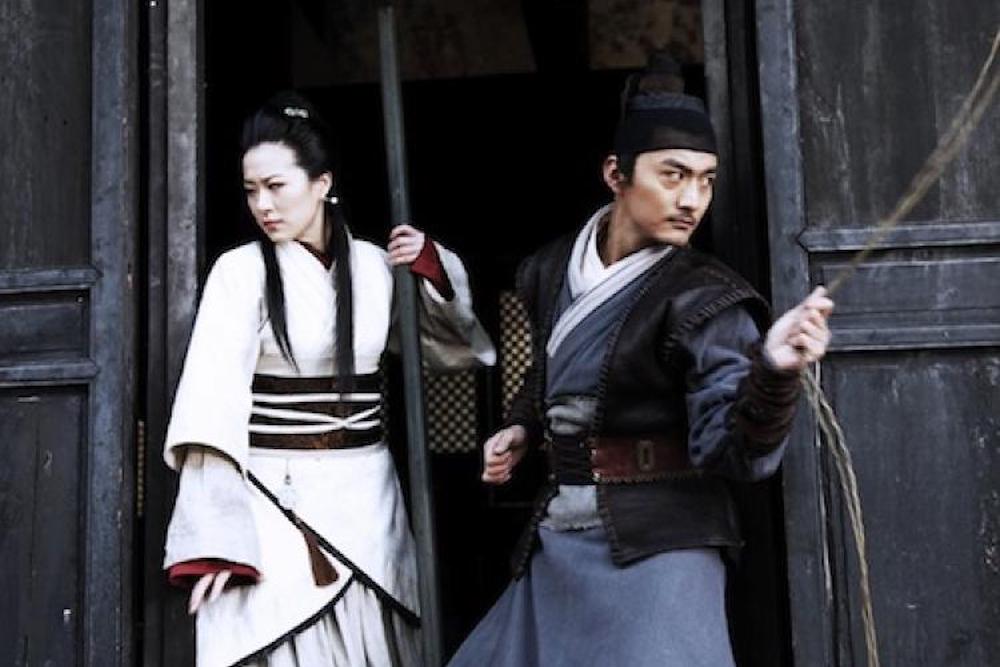By Chlotrudis Independent Film Society
Rating: 4 cats
Director: Haofeng Xu
Starring: Cheng-Hui Yu | Yang Song | Yuanyuan Zhao

Original language title: Wo kou de zong
Country: china
Year: 2012
Running time: 108
IMDB: http://www.imdb.com/title/tt2044077/
Jason says: “It might not be obvious from the opening, which is a fine action sequence, but THE SWORD IDENTITY perhaps works best as the straightest-faced spoof of martial arts films imaginable. It’s more than that, of course, but its sincere demolition of certain things that the form holds dear might be what sticks in the viewer’s memory.
“For over two hundred years, the tradition has been that if one can defeat the four martial arts houses in Shuangye Town, one could open a school of one’s own. A generation ago, General Qi defeated the Japanese pirates by co-opting and improving their sword design, and now his last two surviving bodyguards aim to teach the use of that sword. The establishment has rules against using foreign weapons, though, so they capture the older man and brand the younger one (Song Yang) as a Japanese pirate himself, making him a fugitive trapped on a boat with Sailan, a nomadic dancing girl. Among the masters ready to defeat him
is Master Qiu, who years ago retreated to the mountain after being cuckolded by his beautiful young wife.
“In structure and also in style, this seems like a very conventional martial arts picture, albeit one with some potential for comic relief – Sailan’s early frustration that her well-paying client is keeping her from seeing the martial arts demonstrations is kind of adorably petulant. Eventually, though, words spoken by one of the characters – ‘martial arts is not military combat’ become a major theme of the movie: The strict rules employed by the martial artists turn out to be a major liability when the opponent doesn’t go in for honorable combat but instead thinks tactically. A lot of laughs come out of how the martial arts masters and their best students are bested by a humble opponent as a result. It’s a funny way to drive the film’s central point home – sticking to a rigid definition of what their art should be has made the masters’ skills of little practical use.
“While all that’s going on, the film is also presenting us the story of Master Qiu, and while it does borrow some cues from the film’s other half, it’s at times so internal that its intentions can be unclear. It appears that Qiu’s self-imposed exile was meant as a cruel strike at his wife – as long as he is alive, Madam Qiu Shi and her bodyguard Gan Gang cannot openly be with each other – but given how we learn of both his generosity and vanity early on, it’s not quite clear what his plans were at the start – did he change his mind midway through, or is the other way things could have ended merely a passing fantasy.
“Maybe novelist/writer/director/editor Xu Haofeng could have made this more clear, or maybe it’s not meant to particularly matter. Either way, he does a nice job of meshing the two storylines together so that one seldom detracts from the other. He’s got a good crew handling the fight scenes – even the ones that are meant to be over in a comically quick way are set up well – and gets good performances out of his actors. Sometimes, perhaps a little too good – the comic relief characters like the commander of the local coast guard and the other dancing girls grab hold of the movie to easily become the most memorable parts of it.
“That’s going to surprise some people, because THE SWORD IDENTITY will almost certainly be sold more as a traditional martial-arts picture, supposedly about whether Qi’s long swords became regarded as legitimately Chinese or not. And while it works that way, it’s the willingness to mock the genre – in ways sometimes deadpan and sometimes broad – that will stick in a viewer’s memory. 4 cats
“Seen 22 July 2012 in Concordia University Theatre Hall (Fantasia 2012, DCP)”
